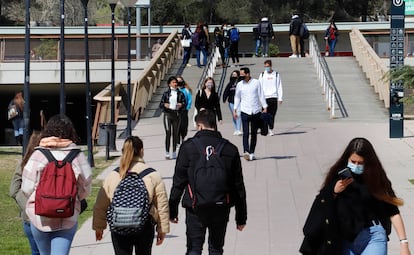Bank of Spain warns of tough post-Covid economic legacy for youths
Central lender says the pandemic has intensified existing problems with job market imbalances, quality of education, access to affordable housing and more

The economic legacy awaiting Spanish youths was already bad before the coronavirus pandemic, but now it is even worse, the Bank of Spain is warning.
In a study, titled The Covid-19 crisis and its impact on the economic conditions of young generations, the central lender provides a long list of both temporary and structural problems that touch on education, demographics, housing and the job market, to explain why young people will feel the crisis more intensely.
The list includes the suspension of in-person learning, a university system with longstanding quality issues, a pre-pandemic expansive cycle that failed to restore former income levels in young households, a larger share of youths out of a job due to the pandemic, job retention schemes that benefited them less than other workers, high barriers to affordable housing, high public debt levels and increased government spending on pensions.
The analysis was presented by Óscar Arce, the Bank of Spain’s director general for economics, statistics and research, at Alcalá University in Alcalá de Henares in Madrid. Speaking at the presentation, Arce noted that there is no precedent for the impact of the pandemic on the Spanish economy, and that there is still a lot of uncertainty about how fully or quickly affected sectors will recover.
We have solved a few problems but not others. The most obvious one for the last 20 years, which remains unresolved, is the duality of the job marketÓscar Arce, Bank of Spain director for economics, statistics and research
In terms of education, Arce noted that the impact of classroom closures has yet to be fully felt. In the United States and Belgium, there is some evidence that math performance has declined. Spain went into the pandemic with an unfavorable situation, as a country with one of the highest percentages in Europe of 25-to-29-year-olds with only a primary school diploma. On the other hand, the lack of job opportunities has driven up the number of youths continuing their education.
“Quality problems with the education system are affecting the employability of university graduates,” reads the paper. Compared with the euro zone, Spanish graduates have a harder time finding a job that reflects their training. The Bank of Spain has recommendations to improve that process: “It is necessary to improve the hiring system for teaching and research staff and to reinforce funding while linking it to reaching excellence goals.”
Meanwhile, the cycle of economic growth that was pulling Spain out of the previous crisis was cut short by the coronavirus pandemic, and young households have failed to recover their income levels. Added to this is the fact that young people have less of a presence in the Spanish job market, and when they do have a job it is more likely to be on a temporary contract with lower wages. Arce was very critical of the Spanish labor market. “We have solved a few problems but not others. The most obvious one for the last 20 years, which remains unresolved, is the duality of the job market: many young people on temporary contracts lose their position when a crisis hits. We have seen this now because out of 900,000 newly unemployed, around 700,000 were temporary workers. There is a lot left to do in this field,” he said.

Losing their job altogether has also meant that youths were unable to benefit from the government’s ERTE furlough scheme. As a result, this demographic has sustained the biggest drop in income during the pandemic, according to the Bank of Spain. If 30% of under-30s had no income whatsoever before the pandemic, that rate had grown to 35% by December 2020.
The financial difficulties experienced by Spanish youths are also delaying their personal independence. Around 87% of people born in 1988 were still living with their parents at age 26, compared with 82% of those born in 1976. And there are fewer young people who own their own homes. “In the space of one generation, the share of young homeowners has dropped nearly 20 points, something unseen in Spain in the last few decades,” said Arce.
Instead, the share of rental homes with a main wage earner under the age of 35 has grown over 12 points to reach 35%, which combined with a strong rise in the price of rent has taken up much of young people’s income. “Together with France, Spain is the European country where youths spend a larger share of their income on rent, around 30%,” said Arce.
This late independence in turn affects the birth rate. Arce noted that the National Statistics Institute (INE) recently released figures showing a 20% drop in births in January 2021 compared with the same month in 2020.
The pandemic has also forced the government to make unexpected expenditures to stimulate the economy, and pensions have recently been adjusted to reflect the Consumer Price Index (CPI), all of which will require fiscal consolidation in the future. And young people will bear the brunt of that effort. Arce said that working lives will have to be extended to reflect the duration of biological lives, in turn requiring older workers to learn new skills.
“It has been documented that workers lose certain abilities as we get older, but other skills improve with age,” said Arce. “We will need to be active for a longer time if life expectancy continues to increase, and we will have to stay employable longer.”
The Bank of Spain official also noted that the required environmental transition will not come without a cost, and that European recovery funds should be used to mitigate some of these expenses and encourage reforms. To deal will all of these problems, Arce asked for a comprehensive reform plan, a consolidation of public finances once the pandemic ends, and to make the best possible use of the EU funds.
English version by Susana Urra.
Tu suscripción se está usando en otro dispositivo
¿Quieres añadir otro usuario a tu suscripción?
Si continúas leyendo en este dispositivo, no se podrá leer en el otro.
FlechaTu suscripción se está usando en otro dispositivo y solo puedes acceder a EL PAÍS desde un dispositivo a la vez.
Si quieres compartir tu cuenta, cambia tu suscripción a la modalidad Premium, así podrás añadir otro usuario. Cada uno accederá con su propia cuenta de email, lo que os permitirá personalizar vuestra experiencia en EL PAÍS.
¿Tienes una suscripción de empresa? Accede aquí para contratar más cuentas.
En el caso de no saber quién está usando tu cuenta, te recomendamos cambiar tu contraseña aquí.
Si decides continuar compartiendo tu cuenta, este mensaje se mostrará en tu dispositivo y en el de la otra persona que está usando tu cuenta de forma indefinida, afectando a tu experiencia de lectura. Puedes consultar aquí los términos y condiciones de la suscripción digital.








































